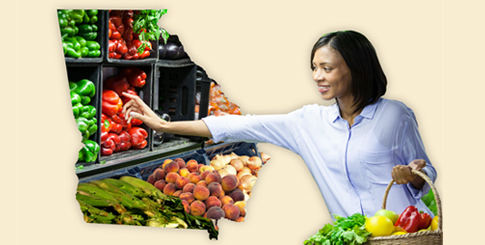Although Georgia is well known as the Peach State, this nickname does a disservice to the fine array of other fruits and vegetables produced each year—like its trademarked Vidalia onions, blueberries, watermelon, tomatoes, and bell peppers. Yes, it’s true orchards in the state grow up to 40 different commercial varieties of peaches, but this year was not a good one for the succulent fruit.
While cucumbers, corn, and cabbages fared well, peach production plummeted in 2017 after an overly warm winter followed by a hard freeze in the early spring. The unusual weather wiped out nearly 80 percent of Georgia’s peach crop along with a significant portion of blueberries. Nevertheless, Georgia’s growers and wholesalers are far from cowed by the setback and have plenty of success stories to talk about this season.
Mother Nature’s Polarity
Before Irma, growers were adversely affected by spring temperatures. “The freeze definitely impacted us,” confirms Clyde Alexander, president of Alexander Produce, Inc., a wholesaler based on the Atlanta State Farmers Market. “Instead of getting an order of 500 peaches, which is what we usually get, we’d get 100 here and 150 there,” he says.
Nickey Gregory Company, LLC at the Atlanta Market had to get creative, bringing in peaches from California. “But everybody wants those nice tree-ripened Georgia peaches,” notes Andrew Scott, director of business development and marketing. Luckily, other items— like South Georgia vegetables such as squash, cucumbers, and cabbage—were readily available.
The state’s unpredictable spring weather did not have a negative impact on another famed crop—the iconic Vidalia onion, which contributes about $50 million to the state’s economy each year from a relatively short season: April to the middle of June.
“Vidalia onions can only be grown in a 20-county region in Southeast Georgia making them extremely unique,” explains John Shuman, president of Shuman Produce, Inc. in Reidsville, near Vidalia. “For retailers, stocking Vidalia onions means providing their customers with the opportunity to purchase the most popular sweet onion in the category.”
Since Vidalia onions are not available all year, growers like Shuman augment sweet onion supply with imports from Mexico or Peru. “Peruvian sweet onion imports are similar in shape and flavor profile, and meet consumer demand during the fall and winter months,” he says. “While Vidalia continues to be the benchmark of our business, we feel it’s possible to achieve good quality sweet onions from Peru and Mexico.” Shuman adds that he imports Peruvian sweet onions through the Port of Savannah, “thus continuing to impact the state economy of Georgia.”



